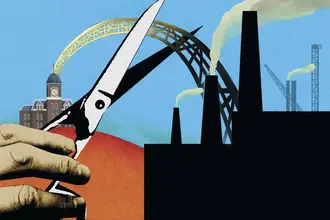-
Tax Their Billions Hildesheim: Überreichtum besteuernEgal, wer wir sind oder woher wir kommen, wir alle glauben, dass jeder seinen Beitrag leisten sollte, damit es unseren Kommunen und Gemeinschaften gut geht und sie gedeihen. Doch wir brauchen Veränderungen, damit unsere Bedürfnisse an erster Stelle stehen. Wir brauchen saubere Luft, warme und sichere Wohnungen, die wir uns leisten können, und zukunftsfähige Arbeitsplätze und Ausbildung. Unsere Krankenhäuser, Bibliotheken und Schulen sollten gut ausgestattet und einladend sein. Doch anstatt in sichere, gut funktionierende und gedeihende Kommunen und Gemeinschaften zu investieren, haben politische Entscheidungen inmitten steigender Lebenshaltungskosten zu höheren Steuern für uns und weniger Steuern für die Superreichen geführt. Zusätzlich heizen Superreiche die Erderhitzung weiter an und verschärfen bestehende Ungleichheiten. Ein Milliardär emittiert in 90 Minuten mehr CO2 als ein Durchschnittsmensch in seinem ganzen Leben. (1) Mit einer Vermögenssteuer können jährlich Milliarden, ja sogar Billionen, aufgebracht werden, um Dinge zu finanzieren, die wir alle dringend brauchen, wie günstige Wohnungen, gut ausgestattete Krankenhäuser, Schulen, Kitas, den öffentlichen Nahverkehr, gut isolierte Häuser und erschwingliche, erneuerbare Energie – hier und in den Ländern, die am wenigsten für die Klimakrise verantwortlich sind. Der Stress, den viele von uns jeden Tag erleben, könnte nachlassen, weil wir wüssten, dass für alle gut gesorgt ist. Tax Their Billions! Lasst Superreiche für die Lösung der Klimakrise und ein gutes Leben für alle Zahlen. (1) Oxfam, 31. Oktober 2024, Wie Superreiche die Klimakrise befeuern2,009 of 3,000 SignaturesCreated by Josephine Konopka
-
Müze Gazhane Gücünü Yenilenebilir Enerjiden Alsın!19. yüzyılda İstanbul'a havagazı tedariki için kurulan Hasanpaşa Gazhanesi 1993'te kapatıldı. Yıkılması gündemde olan bölgeye Gazhane Çevre Gönüllüleri sahip çıktı ve gazhanenin bir kültür mirası olarak addedilmesi için uzun yıllar mücadele etti. 2021 yılında ise İstanbul Büyükşehir Belediyesi tarafından Müze Gazhane olarak yeniden açıldı. Çeşitli etkinliklerin, kültür faaliyetlerinin gerçekleştiği Müze Gazhane içerisinde bir de İklim Müzesi'ni barındırıyor. Eskiden bir fosil yakıt tedariki merkezi olan, bugün ise içinde İklim Müzesi'ni barındıran Müze Gazhane'nin elektriğini yenilenebilir enerjiden almalı. Gücünü yenilenebilir enerjiden alacak Müze Gazhane'nin ancak o zaman İklim Müzesi'ni hakedeceğine ve gerçek anlamda dönüşümünü tamamlayacağına inanıyorum.3 of 100 SignaturesCreated by Efe Baysal
-
Infra Fürth: Raus aus der Gaslobby, raus aus Zukunft Gas!Wir wollen unser Stadtwerk für seine Verpflichtung zum Gemeinwohl jetzt zur Verantwortung ziehen. Es ist an der Zeit, dass unsere Infra Fürth aus Zukunft Gas aussteigt und stattdessen in eine bessere, gerechtere und saubere Zukunft mit erneuerbarer Energie investiert. Denn die Wissenschaft zeigt deutlich, dass fossiles Gas nicht Teil unserer Zukunft sein kann. Vielfach als Brückentechnologie angepriesen sind Erdgas und aus ihm abgeleitete Gase wie fossiler Wasserstoff alles andere als klimafreundlich. Wie Studien zeigen, zerstören sie durch das bei der Verbrennungvon Erdgas enstehende CO2 sowie bei der Förderung frei werdenden Methan das Klima nicht minder stark als Kohle. Unterstützen wir unser Stadtwerk dabei, sich gegen die manipulative Taktik der Gaslobby zu stellen und eine saubere, gerechte und leistbare Zukunft voranzutreiben. Wir haben die Macht, unsere lokalen öffentlichen Einrichtungen zur Rechenschaft zu ziehen und so einen wichtigen Anstoß für die dringend benötigte Transformation zu geben. Wir wollen nicht länger hinnehmen das öffentliche Gelder der Stadtwerke durch ihren Mitgliedsbeitrag an die Gaslobby fließen und jene dann zu PR gegen eine dringend notwendige Transformation zweckentfremdet werden!49 of 100 SignaturesCreated by Fabian Schmitt
-
Stadtwerke Augsburg SWA: Raus aus der Gaslobby, raus aus Zukunft Gas!Wir wollen unser Stadtwerk für seine Verpflichtung zum Gemeinwohl jetzt zur Verantwortung ziehen. Es ist an der Zeit, dass unser Stadtwerk in Augsburg aus Zukunft Gas aussteigt und stattdessen in eine bessere, gerechtere und saubere Zukunft mit erneuerbarer Energie investiert. Denn die Wissenschaft zeigt deutlich, dass fossiles Gas nicht Teil unserer Zukunft sein kann. Unterstützen wir unser Stadtwerk dabei, sich gegen die manipulative Taktik der Gaslobby zu stellen und eine saubere, gerechte und leistbare Zukunft voranzutreiben. Wir haben die Macht, unsere lokalen öffentlichen Einrichtungen zur Rechenschaft zu ziehen und so einen wichtigen Anstoß für die dringend benötigte Transformation zu geben.1 of 100 SignaturesCreated by Konstantin Hammerbacher
-
Stadtwerke Hanau: Raus aus der Gaslobby, raus aus Zukunft Gas!Wir wollen unser Stadtwerk für seine Verpflichtung zum Gemeinwohl jetzt zur Verantwortung ziehen. Es ist an der Zeit, dass unser Stadtwerk in Hanau aus "Zukunft Gas" aussteigt und stattdessen in eine bessere, gerechtere und saubere Zukunft mit erneuerbarer Energie investiert. Denn die Wissenschaft zeigt deutlich, dass fossiles Gas nicht Teil unserer Zukunft sein kann. Unterstützen wir unser Stadtwerk dabei, sich gegen die manipulative Taktik der Gaslobby zu stellen und eine saubere, gerechte und leistbare Zukunft voranzutreiben. Wir haben die Macht, unsere lokalen öffentlichen Einrichtungen zur Rechenschaft zu ziehen und so einen wichtigen Anstoß für die dringend benötigte Transformation zu geben.71 of 100 SignaturesCreated by Eva-Marie Merget
-
Stadtwerk am See: Raus aus der Gaslobby „Zukunft Gas”!Wir wollen unser Stadtwerk für seine Verpflichtung zum Gemeinwohl jetzt zur Verantwortung ziehen. Es ist an der Zeit, dass das Stadtwerk am See aus "Zukunft Gas" aussteigt und stattdessen in eine bessere, gerechtere und saubere Zukunft mit erneuerbarer Energie investiert. Denn die Wissenschaft zeigt deutlich, dass fossiles Gas nicht Teil unserer Zukunft sein kann. Unterstützen wir unser Stadtwerk dabei, sich gegen die manipulative Taktik der Gaslobby zu stellen und eine saubere, gerechte und leistbare Zukunft voranzutreiben. Wir haben die Macht, unsere lokalen öffentlichen Einrichtungen zur Rechenschaft zu ziehen und so einen wichtigen Anstoß für die dringend benötigte Transformation zu geben. Bild: Markus Mauthe68 of 100 SignaturesCreated by Friedrichshafen Zero
-
Badenova: Raus aus der Gaslobby, raus aus Zukunft Gas!Wir wollen unser Stadtwerk für seine Verpflichtung zum Gemeinwohl jetzt zur Verantwortung ziehen. Es ist an der Zeit, dass die Badenova aus Zukunft Gas aussteigt und stattdessen in eine bessere, gerechtere und saubere Zukunft mit erneuerbarer Energie investiert. Denn die Wissenschaft zeigt deutlich, dass fossiles Gas nicht Teil unserer Zukunft sein kann. Unterstützen wir unser Stadtwerk dabei, sich gegen die manipulative Taktik der Gaslobby zu stellen und eine saubere, gerechte und leistbare Zukunft voranzutreiben. Wir haben die Macht, unser Stadtwerk in Freiburg und unsere lokalen öffentlichen Einrichtungen zur Rechenschaft zu ziehen und so einen wichtigen Anstoß für die dringend benötigte Transformation zu geben.122 of 200 SignaturesCreated by Jonathan S
-
Fossil Free Stellenbosch UniversityClimate change is a global crisis. Its implications will impact every global citizen, with the most disastrous consequences being felt by the impoverished. As stakeholders of Stellenbosch University, we as students must require the university's administration to invest in our future, and the future of our children, by divesting the university's endowment funds from fossil fuels and reinvesting them into sustainable funds. As members of the Stellenbosch community, we must ensure that the town's university - which has a substantial impact on Stellenbosch's development - administrates its funds sustainably, to ensure its long-term financial health. And as citizens of South Africa - a region threatened by extensive drought due to global warming - we must hold one of the wealthiest public universities in the country to account for funding climate change.152 of 200 SignaturesCreated by Anais Breytenbach
-
Ask South Yorkshire Pension Authority to invest ethically and divest from fossil fuelsSince its formation in 1988, South Yorkshire Pensions Authority has worked hard on behalf of its nearly 140,000 members to provide them with a safe and secure future in retirement. Yet while ever it invests in unethical companies or industries, including fossil fuels and tobacco, the Authority is putting these achievements at great risk, by undermining long-term commitments to maximise pension fund investments and to provide good service to fund members. (The over 300 employers contributing to the Authority's schemes are also at risk, as it is they who will ultimately meet any shortfall in the cost of providing scheme benefits to retired members.) The South Yorkshire Pensions Authority (SYPA) which manages the Local Government Pension Scheme has £259m invested in companies with fossil fuel and fracking connections such as Shell, BP and Glencore, 4.25% of its £6.1bn holdings (as at Mar 2016). It also holds investments in companies which fail to balance their focus on profit with the social and environmental responsibilities expected in the modern day. We believe it is morally indefensible to invest in companies that destroy our climate and so leave to our children a world where life as we know it is unsustainable. And that it is financially irresponsible to invest in such a high risk sector where the experts agree that the assets are currently wildly overstated and where share prices are certain to plummet.701 of 800 SignaturesCreated by Janet paske
-
Faça com que a exploração de Fracking seja banido do BrasilDe onde vem e para onde vai a água utilizada na exploração do gás de xisto? Essas questões geram frequentes polêmicas e debates, uma vez que produtos químicos são utilizados nesse tipo de extração. De acordo com o conselheiro da Sociedade Brasileira para o Progresso da Ciência (SBPC), o pesquisador Jailson de Andrade, ainda faltam estudos criteriosos sobre o assunto. Andrade alerta, sobretudo, para a carência de informações que identifiquem onde as jazidas de gás natural estão localizadas e se estão perto de aquíferos importantes. “Os estudos realizados até agora são contestados. Não se sabe para onde vai a água contaminada por produtos químicos utilizados na exploração do gás. Ainda não há uma experiência no Brasil que possa se tomar como base. Falta informação”, diz. Apesar de os dados ainda serem imprecisos, existem companhias ansiosas por entrarem em processos licitatórios de exploração do gás de xisto no Brasil, e outras vislumbrando lucros para despoluir a água e as áreas porventura afetadas pela sua extração. O pesquisador observa, no entanto, que não há tecnologia para despoluir os aquíferos, caso eles sejam atingidos. Para Andrade, esse é um dos pontos cruciais a serem resolvidos. “A exploração do gás de xisto sem critério afetará a água sob nosso solo, já que a rocha a ser fraturada (o folhelho Irati) encontra-se a algumas centenas de metros abaixo do aquífero Guarani, na bacia geológica do Paraná”, detalhou. O Guarani é uma das maiores reservas subterrâneas de água doce do mundo. Tem a capacidade de abastecer, de forma sustentável, muitos milhões de habitantes, com trilhões de metros cúbicos de água doce por ano. No Brasil, está no subsolo dos estados de São Paulo, Goiás, Minas Gerais, Mato Grosso, Mato Grosso do Sul, Paraná, Santa Catarina e Rio Grande do Sul. Na visão de parlamentares, estudiosos e pesquisadores, essa riqueza pode estar ameaçada por uma enorme pressão econômica, a exemplo do que já ocorre nos Estados Unidos. A exploração de xisto utiliza o método de fraturação hidráulica, chamado em inglês de “fracking”. Trata-se de injeção de toneladas de água, sob altíssima pressão, misturada com areia e produtos químicos, com o objetivo de quebrar a rocha e liberar o gás nela aprisionado. Nos EUA, 90% dos poços de gás de xisto são perfurados com a utilização dessa técnica. Esse tipo de extração utiliza vinte vezes mais recursos hídricos do que as técnicas convencionais. Com isso, as pequenas cidades norte-americanas nos arredores dos poços de gás de xisto enfrentaram problemas de falta d’água para consumo e agricultura, além da contaminação dos aquíferos subterrâneos e das reservas de água potável. Mas a falta de água não é o único problema. Destacam-se ainda, a excessiva circulação de caminhões, a injeção de fluidos que provocam pequenos abalos sísmicos, a ausência de regulamentação, a presença na água de pequenas quantidades de produtos químicos e metais pesados cancerígenos, bem como a acumulação de metano, que pode provocar explosões. “Há um estudo da National Academy of Science, nos Estados Unidos, que mostra que, em 141 poços de água potável na Pensilvânia, quanto mais próximo de áreas de exploração de gás não convencional, maior a quantidade de metano (tóxico e inflamável) na água”, informou Jailson. “A controvérsia na literatura é se isso já existia antes ou se é resultado da perfuração para obtenção de gás”, observou Andrade. Nomenclatura equivocada – Há uma longa e equivocada tradição brasileira de se chamar o folhelho (shale) de xisto (schist). Apesar disso, os especialistas esclarecem que é incorreto chamar o gás de folhelho de gás de xisto: “O xisto é uma rocha metamórfica que sofreu grandes transformações geológicas, não possibilitando a geração de gás; o folhelho, por sua vez, é uma rocha sedimentar com grande quantidade de matéria orgânica que dá origem ao gás”, explica Jailson Andrade. O gás de folhelho, encontrado em áreas de permeabilidade relativa e também chamado de “gás de xisto”, é um dos três tipos de gases não convencionais cuja ocorrência não está associada a bolsões de gás armazenados a partir das camadas de petróleo. Estas produzem o gás fóssil convencional, encontrado na plataforma continental e em outras regiões do Brasil. Os demais gases não convencionais são o confinado (tight gas), com ocorrência em rochas impermeáveis ou de baixa permeabilidade, e o metano associado a camadas de carvão. Camila Cotta, especial para o Jornal da Ciência/SBPC EcoDebate, 14/08/20147 of 100 SignaturesCreated by 350.org Brasil
-
OIL FREE SEAS AustraliaThose we have elected are failing the Australian people and they are failing the natural world. They are allowing the cruel and unnecessary slaughter of sea creatures and the ruin of undersea habitats. We demand our Governments manage natural resources and the global commons solely in the best interests of present and future citizens. Our oceans should not be exploited by individual nations or corporations but held in trust for the benefit of all and for future generations.787 of 800 SignaturesCreated by OIL FREE SEAS Australia
-
Don’t let California Backslide to More Dirty EnergyOur electric utility, SDG&E, plans to replace the shut down San Onofre nuclear power plant with massive amounts of new gas power – through an insider deal that doesn’t allow clean energy options to compete. This rush for more fossil power would come at a major cost to energy customers, public health and our climate. Help us urge state regulators to reject this reckless plan and send a clear message to all the utilities that California is committed to clean energy. We can meet California’s energy needs reliably and affordably with clean energy, yet SDG&E is pushing a proposal that would lock in huge amounts of unnecessary, expensive and polluting fossil power for years to come. This natural gas bonanza carries a big price tag for our climate. We've already seen an increase in climate pollution from natural gas generation in the wake of San Onofre closing. Permanently increasing our dependence on fossil power would put California even father behind on our carbon reduction and clean energy targets. Sign the petition to stop this dirty energy proposal in its tracks, and send a clear message to all California utilities that energy consumers demand clean affordable energy options.602 of 800 SignaturesCreated by Masada Disenhouse











